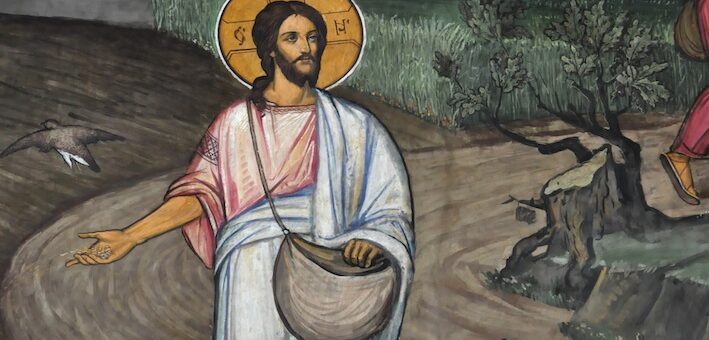Commentary on Mark 4:1-34
The first three chapters of Mark are fast-paced and thrilling. The gospel account opens with the astonishing words, “The beginning of the good news of Jesus Christ, the Son of God” (1:1). With the firing of this starting pistol, the narrative is off and running. One moment John baptizes Jesus in the Jordan, the Spirit descends on Jesus, and a voice from heaven affirms his unique identity as God’s beloved Son (1:9–11). The next, the Spirit drives Jesus out into the wilderness to be tempted by Satan for 40 days (1:12–13). The story sprints onward again, and this time Jesus is back in Galilee launching his earthly ministry. He preaches the kingdom of God as being here and now and calls his first disciples (1:14–20).
As the exciting chase continues through Mark, there is so much to take in: miraculous healings, exorcisms, and encounters with polarizing people along the way. Some are receptive to Jesus. Others are either unsure or hostile toward him.
Then we arrive at Mark 4. The narrative pace slows noticeably. The quick action sequences of the previous chapters give way to room to reflect on what has happened so far: Who is this Jesus at the center of all the action? The hubbub of the crowds, the grumbling of the religious leaders, and the murmurings of Jesus’ family fade away. Instead, the narrative steeps us in a quiet agrarian contextual world, a world in which Jesus invites us to stop scanning the surface from afar and instead go up close with him to observe how a seed sprouts and grows.
After this dramatic caesura, and after the crowd is told to listen up, Jesus relates three parables … about seeds, of all things (The Parable of Four Soils [4:1–9, 13–20], the Parable of the Seed Growing [4:26–29], and the Parable of the Mustard Seed [4:30–32]). His chosen metaphor for God’s reign is seed? Why compare God’s glorious kingdom to displaceable seeds that birds consume, the sun scorches, and thorns choke and suppress (4:3–7; 13–19)?
A seed is ostensibly frail, but given a little water, it has the power to crack open hard ground, displace stones, and fill empty space with lush, fragrant life. Though it is tiny, it contains the entire genetic package to produce a magnificent living organism. The force of life in a single seed is immeasurable, though hidden. Its growth is painstakingly slow, barely perceptible. Yet, sure enough, in good soil it grows: “first the blade, then the ear, then the full grain in the ear” (Mark 4:28). Its life is irrepressible. Then, one day, it finally unveils its true beauty and glory.
The paradoxical nature of the seed is analogous to the mystery of God’s kingdom. Jesus tells these parables not only as the Sower of the message of this kingdom, but also as its Bearer. He is the “Seed to whom the promise referred [to Abraham] had come” (Galatians 3:19 New International Version). Through Jesus, all sinners are made righteous by faith and become “Abraham’s seed”—heirs to the incredible blessings of God. The problem is that Jesus is seed. He is “a young plant, and [is] like a root out of dry ground,” with “no form or majesty that we should look at him, nothing in his appearance that we should desire him” (Isaiah 53:2). He is an odd seedling that sprang up in Caesar’s imperial world—a child born to a young girl out of wedlock, a lowly carpenter’s son, a native to an unimpressive hill-country. Jesus the Seed is paradoxical. Indeed, he is so baffling, disruptive, and inconceivable that many rebuff the message of his kingdom.
And if we are honest, we often do too. We like the Jesus who performs the wonders and miracles we seek. But the Jesus who comes not with a sword but with seeds to sow? We are unimpressed. We would rather chase after a Messiah who is God’s beloved than follow the Messiah who is “stricken, struck down by God, and afflicted” (Isaiah 53:4). How do we understand the Anointed One who dies as seed to give life to many (Mark 10:45)? The parables in Mark 4 do more than point to the truth of God’s mystery revealed in the person of Jesus; they also expose the truth about our readiness to welcome the Seed that gives life to the world.
As preachers and teachers, we spend our days tending others’ gardens. We are so busy sowing the seeds entrusted to us that we can forget to kneel down and examine how our soil is actually doing. When the din of our lives and ministries dies down, who is Jesus to us? Do we accept him on his terms? Is he perfect as he is? Or do we feel the need to embellish him to be more appealing?
Mark shows us repeatedly that Jesus is the holy Son of God who reorders our understanding of God as well as our place in God’s world. With the full authority of God’s Son, Jesus announces the royal news of God’s faithful reign over the sinful, broken world. As God’s pleasing Son, he embodies and demonstrates God’s beatific reign taking over the world. The seeds of Jesus’ message are sown. Will we let them germinate deep within us even as they disturb the soil of our lives? Will we heed his word, let it take strong root in us, let it grow and take over our whole lives? If we do, one day we “shall reap with shouts of joy” (Psalm 126:5).
PRAYER OF THE DAY
God of the Word, in the parable of the sower you showed us how your word can take root and grow within us. Nurture the seeds of your word in our hearts and help us to grow in faith and love. Amen.
HYMNS
Lord, let my heart be good soil ELW 512, TFF 131
Sent forth by God’s blessing ELW 547, NCH 76, UMH 664
CHORAL
He who with weeping soweth, Heinrich Schütz


January 14, 2024